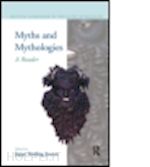Introduction I. Philosophical approaches to the study of myth Introduction Lucien Lévy-Bruhl, ?The transition to the higher mental types? from How Natives Think Susanne K. Langer, ?Life-Symbols: The Roots of Myth? from Philosophy in a New Key Ernst Cassirer, ?The place of language and myth in the pattern of human culture? from Language and Myth Karl Popper, ?The Worlds 1, 2 and 3? from ?Indeterminism is not enough: An afterword? in The Open Universe John R. Searle, ?Language and Social Reality? from The Construction of Social Reality II. Psychological approaches Introduction Friedrich Max Müller, from Comparative Mythology Bronislaw Malinowski, ?Myth in Primitive Psychology? from Magic, Science and Religion Sigmund Freud, ?Introductory lecturers on psycho-analysis? Mircea Eliade, ?Cosmogonic Myth and ?Sacred History?? from The Quest III. Sociological approaches Introduction Émile Durkheim and Marcel Mauss ?Conclusion? from Primitive Classification George Dumézil ?The Gods: Asir and Vanir? from Gods of the Ancient Northmen Mary Douglas ?Primitive Worlds? from Purity and Danger Pierre Clastres ?What Makes Indians Laugh? from Society against the State IV. Semiological and narratological approaches Introduction Claude Lévi-Strauss ?Overture? from The Raw and the Cooked Marcel Detienne ?The Myth of ?Honeyed Orpheus? from Myth, Religion and Society Roland Barthes ?Introduction to the Structural Analysis of Narratives? from The Semiotic Challenge Roy Wagner ?The Theory of Symbolic Obviation? from Lethal Speech V. Cognitivist approaches Introduction Edwin Hutchins ?Myth and experience in the Trobriand Islands? from Cultural Models in Language and Thought Bradd Shore ?Dreamtime Learning, Inside-Out: The Narrative of the Wawilak Sisters? from Culture in Mind Jerome Bruner ?The Transactional Self? from Actual Minds, Possible Worlds Andy Clark, ?Language: The Ultimate Artefact? from Being There VI. Modern Myths and Mythologies












